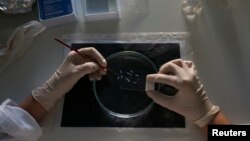Scientists in the United States report a breakthrough in their efforts to find a treatment for Alzheimer's, the most common form of dementia.
They call it "Alzheimer's in a Dish," having successfully reproduced the disease in human brain cells in a laboratory petri dish.
Lead researcher Rudolph Tanzi of Massachusetts General Hospital in the northeastern city of Boston says they grew the brain cells in a gel, then added genes for Alzheimer's. He says the cells soon developed hard clumps known as plaques, and coils known as tangles - both features of Alzheimer's that disrupt normal brain activity.
Tanzi says this breakthrough will help reduce the time and cost of drug development. Until now, researchers had to study the disease in mice, a process that can be very time consuming.
With the petri dish system, Tanzi says scientists can not only test thousands of drugs in a matter of months but also reduce the cost of testing.
News of the breakthrough was published Sunday in the journal Nature.





